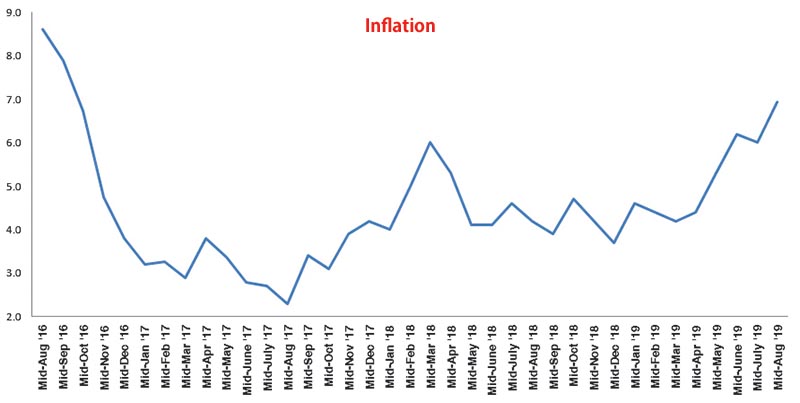Inflation at almost three-year-high of 6.95pc
Kathmandu, September 24
Inflation stood at an almost three-year-high of 6.95 per cent in mid-August following a sharp hike in food prices.
This is the first time consumer prices had shot up to this level since September 2016. If this trend continues, the government will not be able to meet its target of containing annual inflation at six per cent for this fiscal year.
Nepal’s annual inflation stood at below five per cent in fiscal years 2016-17, 2017-18 and 2018-19, largely due to stability in food prices. But since June, inflation has once again started to spiral upwards. In mid-June, inflation shot up to 6.2 per cent and stood at six per cent in mid-July.
A soaring inflation erodes the value of money and increases household expenditure, creating dissatisfaction among people.
Consumer prices are lately going up due to a jump in prices of food items.
Prices of vegetables shot up 23.38 per cent in August compared to the same month a year ago, as per the Current Macroeconomic and Financial Situation report of the first month of the current fiscal year unveiled by Nepal Rastra Bank. In mid-August, prices of fruits and spices also increased 20.2 per cent and 13.2 per cent, respectively, compared to the same month of the previous fiscal year. Overall, food prices, which make a contribution of 43.9 per cent to Nepal’s inflation basket, rose eight per cent in the review month.
“At present, there is no factor that should lead to sharp price hikes. So, weak governance must be the main reason for it,” said economist Bishwo Poudel, suggesting that the government ‘tighten market monitoring and discourage middlemen from taking undue benefits’.
The supply-side constraint, as identified by Poudel, is evident from the widening inflation wedge (deviation) between Nepal and India. Inflation stood at 3.2 per cent in India in August, 3.7 percentage points lower than in Nepal. The inflation difference between Nepal and India has largely been widening since June.
“This could be due to high profit margin that traders maintain, as there is no obstruction in movement of vehicles that carry goods and raw materials or labour protests. Also, production has not been affected. This calls for stringent market inspection,” said Poudel.
Economist Posh Raj Pandey, however, said inflation of 6.95 per cent was manageable, but if consumer prices continue to soar in this manner, appropriate steps would have to be taken sooner than later.






